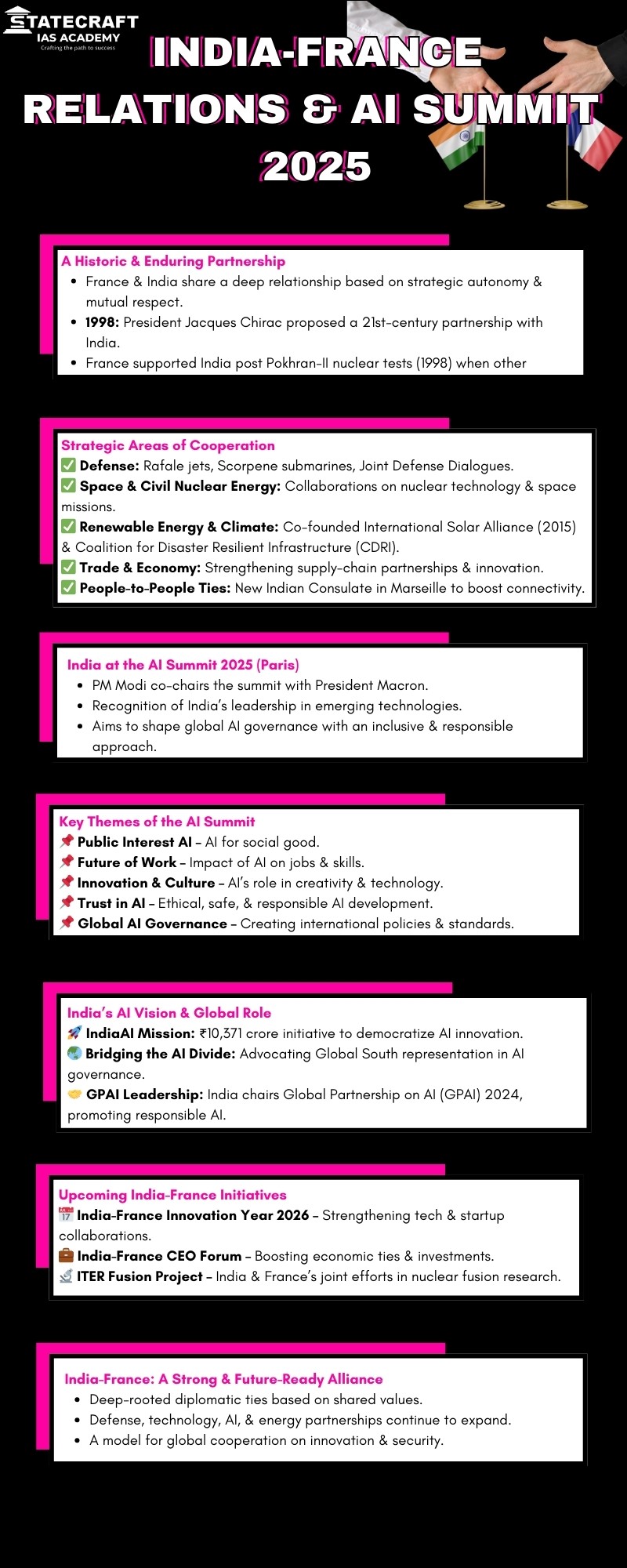1. AI Action Summit & Global AI Regulations
Context
- AI Action Summit held in Paris.
- 58 countries, including India, China, Brazil, France, and Australia, signed a joint statement on “Inclusive and Sustainable AI for People and the Planet.”
- S. and U.K. did not sign the statement.
Key Highlights of the Joint Statement
- Promotes accessibility of AI.
- Ensures trust and safety in deploying AI.
- Aims to foster innovation while preventing market concentration.
- Seeks to positively shape the future of work and labor markets.
- Emphasizes human rights-based, ethical, safe, and trustworthy AI.
- Stresses the urgency to narrow inequalities and assist developing countries in AI capacity-building.
India’s Role
- Co-chaired the summit with France.
- Supports AI-driven industrial recovery and development.
- Advocates for inclusive AI policies that benefit global labor markets.
U.S. Position on AI Regulation
- S. Vice President J.D. Vance opposed “excessive regulation” of AI.
- Argued that over-regulation could hinder AI industry growth.
- Advocated for pro-growth AI policies instead of restrictive regulations.
Significance & Implications
- Highlights global divide on AI governance between regulation-driven and pro-growth approaches.
- Raises concerns about AI safety, ethics, and its impact on labor markets.
- Reflects India’s increasing leadership in global technology and AI discussions.
Marks a shift towards international AI cooperation while addressing developing countries’ needs.
2. Digitisation vs Deregulation & Economic Outlook
Context
- Chief Economic Advisor (CEA) V. Anantha Nageswaran clarifies that digitisation is not the same as deregulation.
- Addressed concerns at an event organized by IVCA (Indian Venture and Alternate Capital Association).
Key Takeaways
- Digitisation vs Deregulation
- There is a misconception that putting regulations online means deregulation.
- What is needed is removal of unnecessary regulations, whether online or offline.
- Digitisation per se is not deregulation but rather a shift from offline to online.
- Economic Growth & Regulation
- India needs to simplify regulations to facilitate GDP growth.
- Developed economies focus on supporting small businesses and reducing regulatory burdens.
- De-globalisation Trend
- De-globalisation is cyclical and has been observed over a century.
- Global inflation is expected to remain high, limiting economic efficiencies.
- India must rely on domestic growth to sustain long-term economic expansion.
- Inflation & Rupee Depreciation
- India’s inflation has been around 4-5%, but reducing it to 3-4% can help stabilise the rupee.
- Over the long term, the rupee has depreciated by 3% per annum, matching the inflation differential with the U.S.
- Energy Security & Transition
- India cannot compromise energy security while transitioning to greener sources.
- Pragmatic approach needed – green energy should not become an ideological “religion” as seen in parts of Europe.
- Nuclear energy must play a key role in India’s energy transition.
Significance & Implications
- Policy-making clarity: Highlights the difference between digitisation and deregulation.
- Economic strategy: Emphasizes reducing regulatory hurdles for businesses.
- Sustainable energy focus: Advocates a balanced transition to green energy.
Inflation control: Aims to stabilize rupee depreciation and enhance economic stability.






